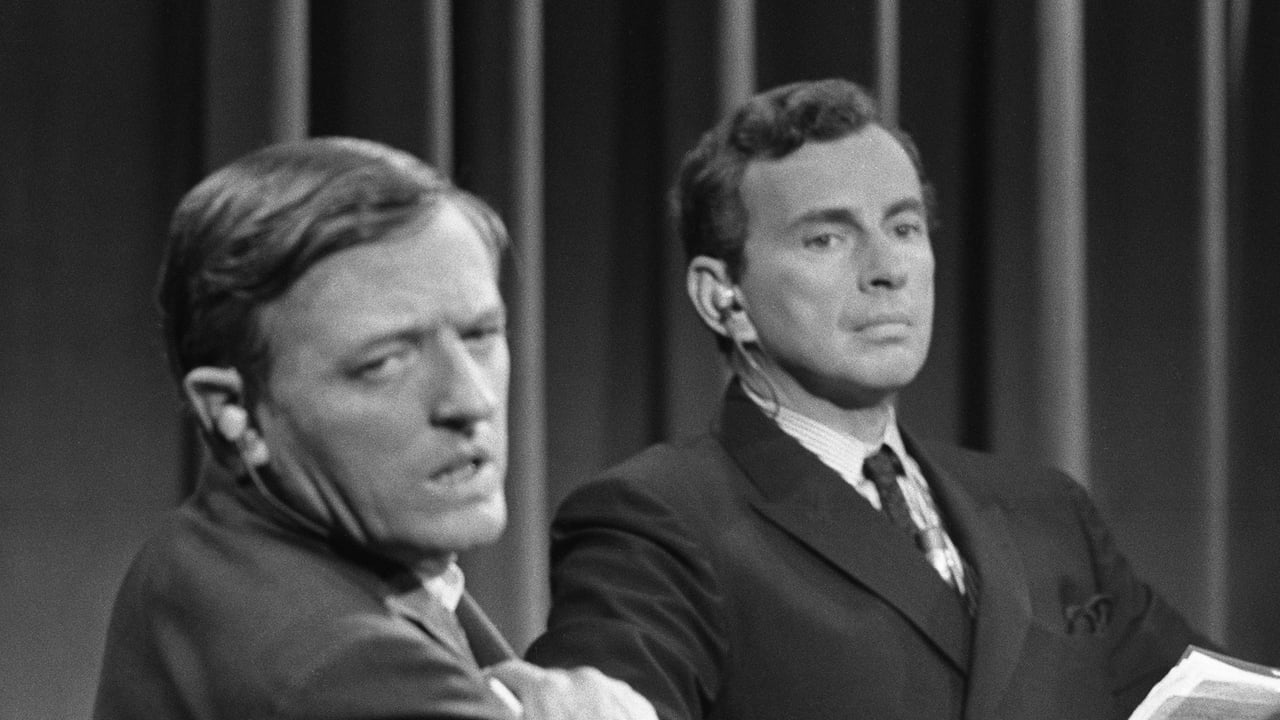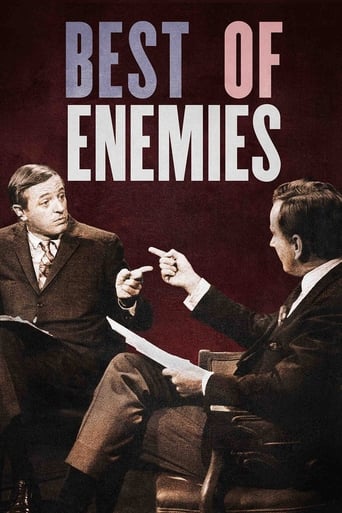

A waste of 90 minutes of my life
... View MoreA Disappointing Continuation
... View MoreVery interesting film. Was caught on the premise when seeing the trailer but unsure as to what the outcome would be for the showing. As it turns out, it was a very good film.
... View MoreThere's a more than satisfactory amount of boom-boom in the movie's trim running time.
... View MoreThis documentary put me in mind of Rumble in the Jungle, the documentary about the fight of the same name; like that one, Best of Enemies looks at a staged conflict which had an impact on popular culture. In this case it was a series of televised debates between Vidal and Buckley – two men on polar political extremes. It was interesting to watch this in the run up to the 2016 Presidential Debate between Trump and Clinton (at the time of writing this, the first one will be in 2 days' time) because it hearkens back to a time where the discourse was a little more civil. It is also interesting to note that there is still an edge to their communication, with Vidal using snide insults (as is the liberal way), and Buckley using more direct language in a jokey way (as is the conservative way).Not knowing anything about these debates, the film does a pretty good job of introducing the characters and their tensions, however it doesn't totally deliver in some key ways. Specifically it didn't bring out the period and the event as well as I would have liked; with Rumble in the Jungle you had a real sense of time/place, as well as the cultural importance of the event. With these debates that was not quite there; it didn't show enough of the debates to really explain why they were such an audience grabber. Likewise the film did not really link to its wider impact particularly well – a lot of this plays out under the credits, which felt weird considering that this was the moment of that shift.As an event, and with its large characters, it still is an interesting and engaging film, but it doesn't feel like it captures the event or its cultural impact in as compelling a way as it could have done.
... View MoreCo-directed by Robert Gordon and Morgan Neville, Best of Enemies chronicles the series of televised debates during the 1968 Republican and Democratic National Conventions, between conservative and liberal pundits, William F. Buckley and Gore Vidal.Television convention coverage was usually a staid affair, but Buckley and Vidal set the tone for years to come by going "mano a mano"— perhaps the first time commentators of such different political persuasions presented such stark differences of opinion in a remarkably entertaining fashion. Indeed, ABC, considered the "poor man's network" at the time (in contrast to powerhouses CBS and NBC), garnered such favorable ratings, that we're informed by Gordon and Neville that television was "never the same" after the broadcast of these imbroglios.Buckley, fairly well-known for his Firing Line show on PBS and Vidal, the noted author of various biographical novels of notable American politicians as well as other historical figures, both shared elite prep school backgrounds as well as being masters of the English language. One is struck however, by the true lack of substance as they grapple with the political issues of the day. Instead, each engages in a game of one-upmanship, trading cutting insults in order to humiliate one another. The debate finally takes an ugly turn when Vidal manages to push Buckley's buttons—calling him a crypto-Nazi and praising the protesters who waved the Vietcong flag and cursed the police outside the Democratic National Convention. Buckley, usually proud of his self-control, suddenly loses it and calls Vidal a "queer" and threatens to punch him in the face. While Vidal argues that the protesters had a perfect right to "free speech," Buckley regards their actions as the deepest betrayal to their country.The documentarians supplement the footage of the actual debate with newsroom out takes along with commentary from supporters and detractors of the two men including Christopher Hitchens, Dick Cavett and James Wolcott.Buckley is seen much later in life being interviewed, indicating that he was tired of life in general and "ready to die." While being interviewed by Ted Koppel, Buckley is stunned as he watches footage from the debates where he calls Vidal a "queer." After the footage is shown, he remarks to a friend that he thought that segment had been destroyed long ago. And Vidal appears equally obsessed with the debates, poring over them repeatedly at his Italian villa, much like an obsessed Norma Desmond watching her old silent pictures in "Sunset Boulevard."While Best of Enemies proves to be vastly entertaining, it's also a cautionary tale about two extremely gifted men who forgot to embrace humor to soften the vitriol between them. In that respect, their ultimate clash on television, should be seen much more in the context of tragedy than mere entertainment or what some others may label as a comic interlude.
... View MoreBest of Enemies is a fascinating documentary film about a series of nationally televised debates in 1968 between two public intellectuals, the liberal Gore Vidal and the conservative William F. Buckley Jr. If that doesn't sound very interesting you couldn't be more wrong. This is a film about two men who absolutely hated each other. Two extremely clever men who fought each other live on television by debating with each that eventually led to personal insults being thrown at each other and it's mesmerising viewing. I have to admit I had never heard of these men before and that's probably because these debates happened a couple of months before I was born but I do know now and I feel much better off for it.
... View MoreI watched this at the Adelaide Film Festival after the Chomsky doomsday doco was sold-out, and I was more than pleasantly surprised at this brilliant production; its incredible wit, resonance and poignancy. I must admit I have not had the opportunity to read the works of Gore Vidal or William F. Buckley (though now I intend to) - prior to watching the film I was aware of Vidal by his reputation as the unabashed gladiator of sexual liberation in an otherwise fiercely conservative social landscape. What surprised me most about the film (as all good films tend to do) is that my preconceptions of the how I would receive Vidal and Buckley during the debates and their personalities were almost turned on their head by the film's end. In the backdrop to the intellectual combat in ABC's studios was one of America's most tumultuous periods; the height of the civil rights movement, violent protests in response to the unpopular occupation of Vietnam and of police state repression. It's disconcerting to see how political discourse, human rights and public institutions of the US have actually stagnated if not regressed since the 1960's. Consider the incendiary milieu that exists in the United States today and the #blacklivesmatter movement. For example, as were in 1968, race riots in Baltimore and evidence of flagrant police brutality in Chicago. What I think "Best of Enemies" illuminates is how, no matter the weight of the intellect of both sides of the argument, pride and human nature will general ensure it devolves into the most primal and puerile name- calling. This is actually what most people want to see. Undoubtedly, Vidal and Buckley were both incredibly strong-willed men and while the production is selective is only focusing on the sledging, it signifies that it was exactly this dynamic that caused the ABC to commission these debates – visceral personal conflict. The major thematic premise of the film illustrates that in the modern world of endless freedom of choice in technology – we have become more disparate. The inception of cable, the internet, social media and hand-held wireless devices have culminated in confined and specific interests and experiences. A world of distracted individuals bound by endless sources of entertainment. Political discourse, for instance, is seemingly ubiquitous but in reality drowned in a sea of radicalism, self-righteousness, triviality and populism. In Buckley and Vidal's era, it seems one at least had to be familiar with the opposing argument to counter it. In contemporary punditry it seems experts are well-versed in their own ideology while seemingly never having been exposed to any context or counter-argument. On a personal level, the documentary seems to acknowledge that Vidal (in interviewing his biographer) was unable to extricate himself from the rivalry long after it seems Buckley had, even though Buckley remained tormented by his on-air explosion. This was interesting considering it was Buckley who shattered his reputation as the ice-cool velvet sledgehammer while Vidal was generally considered victorious, so to speak, in the debates. In fact, it was Buckley that struck me as the more moderate of the two polemicists, perhaps out of some humility later in his life where he could see the wreckage that had become of the conservative movement he had founded. Vidal's animosity towards Buckley is portrayed as intensifying in the latter stages of his life, which seems sad and almost irrational. Unexplored in this feature are the rumours that Buckley had threatened to disclose damaging information about Vidal's private life (the spectre of which has surfaced courtesy of Vidal's disenfranchised family members since his death). Vidal could either be construed as somewhat petulant or paranoid. Nevertheless, the documentary itself is riveting and thought-provoking and charming with a sense of pathos.
... View More